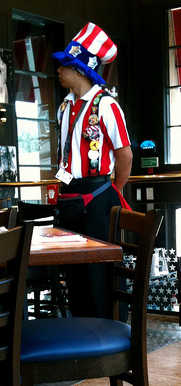
It’s a common problem in post-recession America: you hate your job, but you also can’t just up and get a new one. We usually have social options for dealing with this, ranging from commiserating with co-workers in the breakroom to organizing for better working conditions. But if you work in the service industry, where the customer isn’t too keen on knowing you hate your job, bosses can try to bust up the social bandwagon.
A piece for MSNBC’s The Ed Show makes great use of Arlie Hochschild’s concept of “emotional labor.” The piece gives a handful of examples in which employees, from Starbucks baristas to Wal-Mart greeters, are increasingly burdened with managers’ attempts to regulate how much they demonstrate enjoying their work. The author even quotes one account of employees who could be fired for not touching each other frequently enough!
This raises some fascinating questions for work in the 21st century. We know all social interactions are governed by rules and institutions, but when work is a scarce necessity, do we have the luxury of “doing what we love,” or must we “fake it ‘til we make it”… to a better job?

Comments 3
doug hartmann — February 26, 2013
great example, evan! thanks.
shami — April 16, 2021
Take Dgcustomerfirst survey for winning the $100 gift card.DGCustomerFirst Survey provides a chance to win a $100 gift card and many Dollar General Store coupons. Visit the following link and take the survey.
jennifer domez — December 8, 2021
This was an amazing article... I loved the way it was describrd.